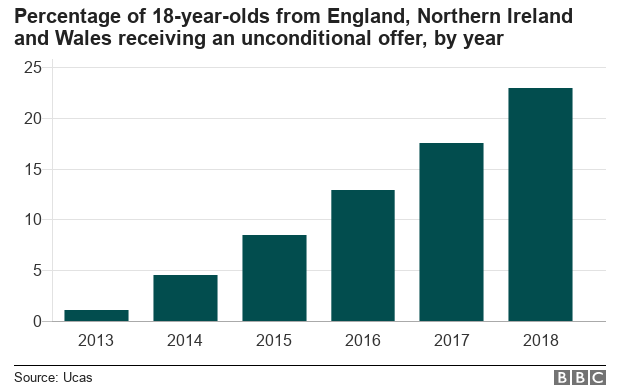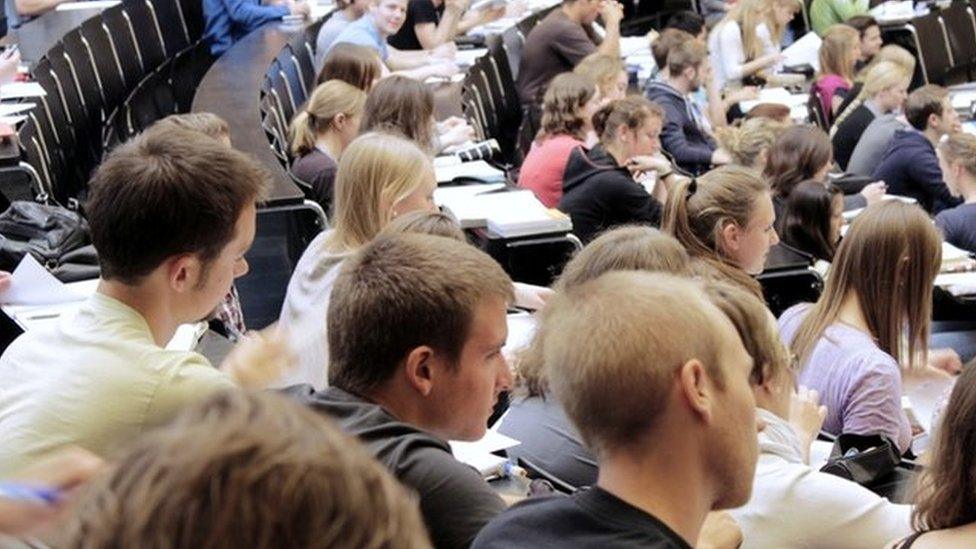University applications could be after A-levels
- Published
- comments

Universities are considering whether to shift the timetable of the admissions system so that applications would take place after students have their A-level results.
A review into the admissions process has been launched by Universities UK.
It will examine whether it would be fairer to move away from a system based on predicted exam grades.
Paul Cottrell, head of the UCU lecturers' union, said an "overhaul of university admissions is long overdue".
The review, to be chaired by Paddy Nixon, vice-chancellor of Ulster University, says it will "draw on best practice from across the UK".
But universities in Scotland have run their own review of admissions, with an emphasis on ensuring access for applicants from deprived areas.
Fairer choices
Universities have been under pressure over entry systems - with criticism over the increasing use of unconditional offers, in which students commit to a university place in return for being accepted regardless of their exam results.
Unconditional offers give universities more certainty over their recruitment numbers and finances - but there are concerns this is achieved at the cost of "pressure-selling" tactics on students.
There have also been challenges over whether disadvantaged students have fair access into the most selective universities.
The review, due to report back next spring, will look again at the findings of an inquiry carried out under the Labour government, which called for applications to be made after A-level results - changing to what is called "post-qualification admissions".
At present, students apply and narrow down their selections before they take their A-levels - and universities make offers using the grades predicted by their schools.

But most predicted grades are incorrect and there have been arguments that students would make better informed choices and rely less on guesswork if they could apply after they knew their results.
There have also been social-mobility arguments that under the current system some disadvantaged youngsters might not even apply to universities their subsequent results might have allowed them to enter.
The Sutton Trust education charity has called for an end to the use of predicted grades, with figures showing almost three-quarters of students did not achieve the grades they had been predicted.
'Remove barriers'
This change to a post-results system has been proposed before but a stumbling block has been whether this would mean an earlier start for school exams or a delayed start for beginning university.
The Ucas admissions system allows for some changes after results, in the "clearing" and "adjustment" processes, but there have been calls for a more comprehensive restructuring of admissions.
"There is growing support for a shift to a post-qualification admissions system," said Mr Cottrell, acting leader of the UCU lecturers' union.
"Our research shows such a move would not only be fairer for students, it would bring the UK into line with the rest of the world and eliminate the use of controversial unconditional offers and the chaotic clearing process," he said.
The chief executive of Universities UK, Alistair Jarvis, said the review would help "to build greater levels of transparency, trust and public understanding in admissions practices".
The higher education watchdog, the Office for Students, is to launch its own review of admissions in England later this year.
Chief executive Nicola Dandridge said the aim would be to "remove barriers to disadvantaged applicants, and to promote transparency and clarity about admissions and offer-making processes".
- Published13 November 2017

- Published9 July 2019

- Published26 July 2018
